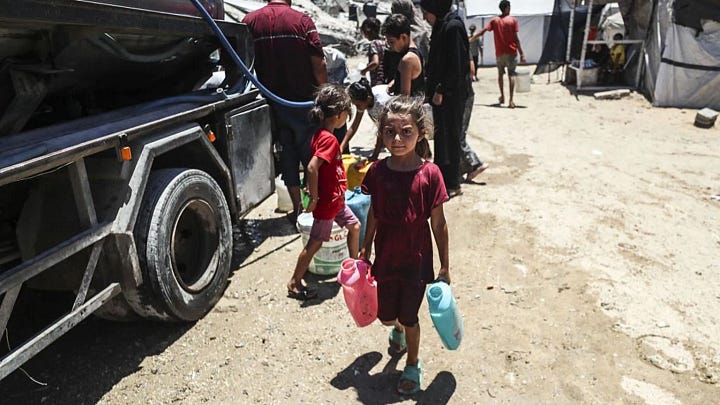What Do You Do After Watching a Child Die on Your Feed?
I’m Alive. They’re Not. That Should Mean Something.
I am ashamed that every day I live a leisurely life is devoid of justice.
This morning I listened to “On Being,” the episode where Krista Tippett interviews a grief therapist who says our bodies are not built to carry the full weight of the world. She speaks softly, in the way people do when they are trying to soothe without sounding patronizing, and tells her audience that it is okay to look away. I’m standing in my kitchen with my thumb on the nespresso (one I bought before they joined the boycott list), nodding along, even though I know I will resent her words by noon.


After breakfast, I open TikTok. The first video on my feed begins with a clip from a comedy page, someone lip-syncing to audio from “Love Island.” A few seconds in, it cuts to a boy in Gaza whose face is streaked with ash and blood. His voice shakes. He is asking for help, explaining that his mother and sister are trapped beneath a collapsed building in Deir al-Balah. Behind him, there is a cloud of dust still rising, and someone offscreen is screaming. I watch for six seconds before my thumb moves to the next video. I tell myself I will come back to it, but I don’t.
Sometimes the videos open with cat memes or astrology jokes. Sometimes they use sped-up Kendrick Lamar tracks or old Vine audios, anything to make the algorithm keep them visible for just a few moments longer. There are children who livestream while hiding under mattresses. Parents who preface their pleas with jokes, because if they do not hook the viewer, the world will scroll past their deaths before they finish a sentence. There are no journalists left in northern Gaza, no food, no fuel, no safe zone. There is only the front-facing camera and the chance that someone, somewhere, might send twenty dollars.
I don’t scroll past because I don’t care. I care so much it feels like my organs are melting some days. I write. I protest. I donate. I fast in solidarity. I boycott. I lose sleep. I say Palestine with my chest. I do everything I know how to do, and still I go on living. I still put on music while I fold my laundry. I still take walks in the evenings. I still write sentences like these and wonder who will read them. I am not sure if that makes me a hypocrite or simply human. But I know something in me has changed. Or maybe it has been stripped away.
There is something corrosive about witnessing this much death and continuing to eat three meals a day. I drink my coffee while soccer players in Gaza, teenagers who had posters of Messi above their beds, are having their legs amputated in makeshift field hospitals. I watch DIY house reno tutorials after watching a man unzip a body bag and collapse when he sees the face of his daughter. I go for a run while hospitals in Rafah perform surgeries without anesthesia on newborns. There is no punchline to this comparison, only shame.
The dehumanization of Palestinians does not begin with bombs. It begins with the quiet decisions people make every day to not know. It lives in the way media reports on mass graves in passive voice. It thrives in the blank stares of people who say the conflict is too complex to take a side. It is reinforced when platforms label footage of war crimes as “graphic content” while livestreaming state violence with monetized ads. It is baked into the infrastructure of our distraction economy.
We have seen this cycle before. During Operation Cast Lead in 2008, Israeli airstrikes began just after Christmas, while the Western world was hungover on holiday lights. In 2014, Gaza was flattened while global attention fixated on the World Cup. In 2018, snipers opened fire on protesters the night of the Met Gala. In 2024, on the night of the Super Bowl, Netanyahu’s war cabinet finalized the Rafah invasion plan. It is not accidental that these massacres are timed with spectacle. They are designed to vanish beneath it.
Many months ago, while American audiences debated the winner of the Kendrick-Drake feud, the remains of Palestinians were being exhumed from mass graves at al-Shifa hospital. UN experts described the scale of mutilation and desecration as “evidence of systemic war crimes,” but it barely registered on the front page of any major paper. Instead, our feeds were filled with slow-motion videos of the Met Gala staircase and video essays about genre-bending diss tracks. In this country, genocide must compete with entertainment. And entertainment wins.
The latest numbers are difficult to comprehend. Over 55,000 Palestinians have been killed since October 2023. Seventeen thousand of them are children. Eighty percent of the population of Gaza has been displaced. More than a million people were pushed into Rafah and then bombed again. The United Nations has called it the fastest starvation campaign in modern history. And still, the U.S. Senate sends more bombs. And still, every news cycle returns to Trump, or Love Island.
I think often about Kanafani, assassinated on this month fifty-two years ago for daring to articulate what it meant to be stateless and still resist. “The Palestinian cause is not a cause for Palestinians only,” he wrote, “but a cause for every revolutionary.” I don’t know how many revolutionaries are left in this country. But I know there are people who care, and they are exhausted. I know that caring is not enough. I know that to feel tired is a luxury denied to those who are digging mass graves for their neighbors.
Darwish once said that “to be Palestinian is to suffer injustice and not surrender, to carry your name and your country in your blood.” But what does it mean to be Palestinian in exile, watching from a distance, unable to breathe through the weight of useless proximity? What does it mean to live while our homeland is being erased in real time?
There are days I resent myself for surviving. For knowing so much and still walking upright. For writing this from a café where the air conditioning works and the barista tells me to have a good day. And there are other days I remind myself that the goal is not to feel bad, but to feel responsible. That my grief means nothing if it does not build something. That no amount of knowledge is meaningful unless it turns into action.
There are people in Gaza who livestream their own funerals. There are children who have outlived their entire families. There are teachers who walk through rubble to write the alphabet on broken whiteboards. There are journalists who continue to report with no network, no gear, and no protection, only the obligation to witness.
I do not want to normalize this. I do not want to pacify myself with phrases like compassion fatigue or activist burnout. I do not want a nervous system that adapts to genocide. I want to feel it all. I want to live in a body that refuses to forget. Because forgetting is what they want. Because the bomb does not kill only flesh—it kills memory. And it is memory that keeps us alive.
I do not want this grief to become habit. It is already too familiar, too domesticated by our screens and our rituals of witnessing.
But grief, when it is honest, is a call to disobedience. It refuses the terms we have been given. It insists that this world is not inevitable. That the sky was not always filled with drones, that the land was not always littered with limbs, that history can still bend even under the weight of its own violence.
I do not believe we are powerless. I believe we have been trained to look away. And I believe that to live in this world and not be broken by it, one must refuse that training every day.
The danger is not that we feel too much. The danger is that we begin to feel nothing at all. That we confuse exhaustion with clarity, and numbness with maturity. That we allow our grief to decay into convenience, and mistake survival for absolution.
While we live, Gaza bleeds. While we sleep, families are buried. While we speak of peace, children are shot through the spine. If that does not move us, then nothing will.
This must mean something. It must matter enough to make us act like it matters.
The body can carry this. So can the mind. What cannot carry it is a culture that refuses to ask what it means to be alive in the midst of so much death, and still choose to do nothing.
And if we are not asking that—then what exactly are we surviving for?








This. "I do not want to normalize this. I do not want to pacify myself with phrases like compassion fatigue or activist burnout. I do not want a nervous system that adapts to genocide. I want to feel it all. I want to live in a body that refuses to forget. Because forgetting is what they want. Because the bomb does not kill only flesh—it kills memory. And it is memory that keeps us alive."
So much grief and pain, you have to be inhuman not to feel it. We know the ones who do and who do not.
I read and feel it everyday, so much of the day because I do not want to forget until Palestine is free and the Zionist state is no more.